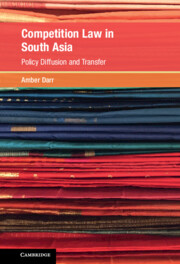Book contents
- Competition Law in South Asia
- Global Competition Law And Economics Policy
- Competition Law in South Asia
- Copyright page
- Dedication
- Additional material
- Contents
- Maps, Figures, and Boxes
- Tables
- Preface
- Abbreviations
- Authorities
- Statutes and Statutory Instruments
- 1 The Theoretical Framework
- 2 Adoption of Competition Laws in India and Pakistan
- 3 The Spread of Competition Laws across South Asia
- 4 Enforcing Indian and Pakistani Competition Acts
- 5 Anti-competitive Agreements and Interpretive Strategies in India and Pakistan
- 6 Understanding Penalties in the Context of the Adoption Process
- 7 Pre-existing Legal Systems and Competition Enforcement
- 8 Implementing Competition Laws across South Asia
- 9 Bridging the Implementation Gap
- Bibliography
- Index
5 - Anti-competitive Agreements and Interpretive Strategies in India and Pakistan
Published online by Cambridge University Press: 16 February 2023
- Competition Law in South Asia
- Global Competition Law And Economics Policy
- Competition Law in South Asia
- Copyright page
- Dedication
- Additional material
- Contents
- Maps, Figures, and Boxes
- Tables
- Preface
- Abbreviations
- Authorities
- Statutes and Statutory Instruments
- 1 The Theoretical Framework
- 2 Adoption of Competition Laws in India and Pakistan
- 3 The Spread of Competition Laws across South Asia
- 4 Enforcing Indian and Pakistani Competition Acts
- 5 Anti-competitive Agreements and Interpretive Strategies in India and Pakistan
- 6 Understanding Penalties in the Context of the Adoption Process
- 7 Pre-existing Legal Systems and Competition Enforcement
- 8 Implementing Competition Laws across South Asia
- 9 Bridging the Implementation Gap
- Bibliography
- Index
Summary
An analysis of the orders of the CCI and the CCP suggest that each national competition authority has its own distinct interpretive strategy which reflects the extent of compatibility and legitimacy generated for the competition legislation in the adoption stage. This chapter examines and compares the CCI and CCP’s interpretation of provisions for horizontal and vertical anti-competitive agreements to extrapolate some understanding of their overall interpretive strategies. The chapter demonstrates that despite the comparable antecedents of the relevant provisions of the Indian and Pakistani Acts, the CCP relied more heavily on foreign precedents in interpreting these provisions than the CCI. The chapter further demonstrates that the disparate interpretive strategies of the CCI and CCP may be explained by the disparity in the compatibility and legitimacy of the acts and to the CCP’s need to leverage foreign precedents to assert its international legitimacy, which in turn helped it to enhance its domestic legitimacy. The chapter finally argues that in addition to reflecting the compatibility and legitimacy generated at the adoption stage, the interpretative strategies adopted by the CCI and the CCP also shape the competition and legitimacy of the acts and chart their implementation trajectory.
Keywords
- Type
- Chapter
- Information
- Competition Law in South AsiaPolicy Diffusion and Transfer, pp. 114 - 141Publisher: Cambridge University PressPrint publication year: 2023



